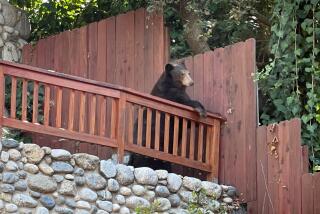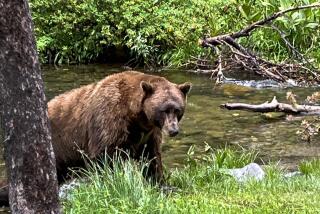Russian Bear Expert Is Killed in the Wild
- Share via
MOSCOW — Vitaly Nikolayenko, one of Russia’s best-known bear researchers and a man who spent 25 years living with the enormous brown bears of the wild Kamchatka Peninsula, has been found dead in an apparent bear mauling, authorities said Tuesday.
The body of Nikolayenko, whose lonely journeys allowed him to compile one of the most exhaustive documentaries on the 9-foot-tall cousins of the North American grizzly, was found at a lake near his remote, one-room hut on the Tikhaya River. The 6 1/2-inch paw print of a medium-sized male was found next to it, along with an empty can of pepper spray with which Nikolayenko had apparently tried to defend himself.
The incident occurred just two months after Malibu bear researcher Timothy Treadwell and his girlfriend were killed by a bear in Alaska’s Katmai National Park.
The diminutive Nikolayenko, a 66-year-old self-educated researcher and photographer, walked more than 620 miles a year through the remote river valleys and coastal plains of Kamchatka, whose giant bears are under increasing threat from foreign hunters and poachers.
A senior ranger in the Kronotsky Wildlife Reserve, Nikolayenko constantly battled illegal hunting and fishing. His patrols kept him in the wilderness for months on end, spending his days following bears and documenting their feeding, mating and social habits.
By night, he would return to his hut, light a kerosene lamp and fill what became hundreds of journals, a body of work that turned into one of the most important records of brown bear behavior. He documented an average of 800 bear contacts each year.
Two Times staffers spent several days with him in the Kamchatka wilderness in the fall. During that time, Nikolayenko plunged into continual encounters with bears. Near the lake where his body was found, he had crouched behind brush as a young bear fished for sockeye salmon only a few feet away. Downstream, a 6-foot male bear Nikolayenko had named Kracavchik -- “pretty face” -- snorted and growled and launched a halfhearted charge as Nikolayenko, grinning at his companions’ terror, watched from the bank.
“He’s an interesting one. He once drove me up a tree,” he said with a smile.
As usual, Nikolayenko was out in the snowy wilderness this month longer than he had planned, probably because not all of the bears had yet gone to their dens. He was waiting for a helicopter flight out of the reserve and was last heard from on Friday, sources in Kamchatka said. A helicopter arrived to pick him up Saturday but the crew found no sign of the researcher. A search was launched Monday.
Victor Rebrikov, a tourism guide and longtime friend of Nikolayenko’s who was part of the search team that found the body, said it appeared that Nikolayenko had followed a large male bear to the small, spring-fed lake that lies less than a mile from his hut. The tracks indicate that at some point, Rebrikov said, he took off his cross-country skis and followed the bear to some brush where it was lying.
“Vitaly must have begun to take pictures of the resting bear, but the tree trunks and branches were in the way, and he must have decided to get inside the grove. His footprints lead into the grove after the bear. He approached the bear at a distance of three meters” or about 10 feet, Rebrikov said.
A large swath of orange pepper spray indicates that Nikolayenko tried to defend himself, and an unfired flare gun was lying next to the body, half of which had been consumed. His camera was broken and bloody nearby. The film has not yet been developed.
Back at the hut, Nikolayenko’s last journal entry was made Thursday, leading investigators to believe the attack occurred Friday. “It was a sarcastic remark about weather forecasts,” Rebrikov recalled.
The researcher’s wife, Tatiana Nikolayenko, had spent most of last week trying to find a helicopter flight to bring her husband home in time for the New Year holiday. She often spent months waiting for him to come back to town.
“I loved him dearly, and he loved me, too. But he had this other passion in his life which was watching bears, and this passion took him away from me,” Tatiana said. “Most of the time, he was out there in the woods. But I knew he would come back, and all my life I was waiting for him.”
Gleb Raygorodetsky, Kamchatka projects manager for the Wildlife Conservation Society, said Nikolayenko drew international attention to the plight of the Kamchatka bears and the threat posed by poaching.
Charlie Russell, a Canadian researcher who this year was saddened by the killings of bears he was studying on the peninsula, said he had professional conflicts with Nikolayenko but respected his work.
“I think there’s a good chance that no one in the world has spent more time in the field with bears than he has, which is very significant,” Russell said.
During an interview with The Times this year, Nikolayenko said he had no regrets about his life’s work.
“Why have I wasted my life following bears? It’s the wrong question,” he said. “I didn’t waste any time. I lived happily.”
Times staff writer Sergei L. Loiko in Moscow contributed to this report.
More to Read
Sign up for Essential California
The most important California stories and recommendations in your inbox every morning.
You may occasionally receive promotional content from the Los Angeles Times.













